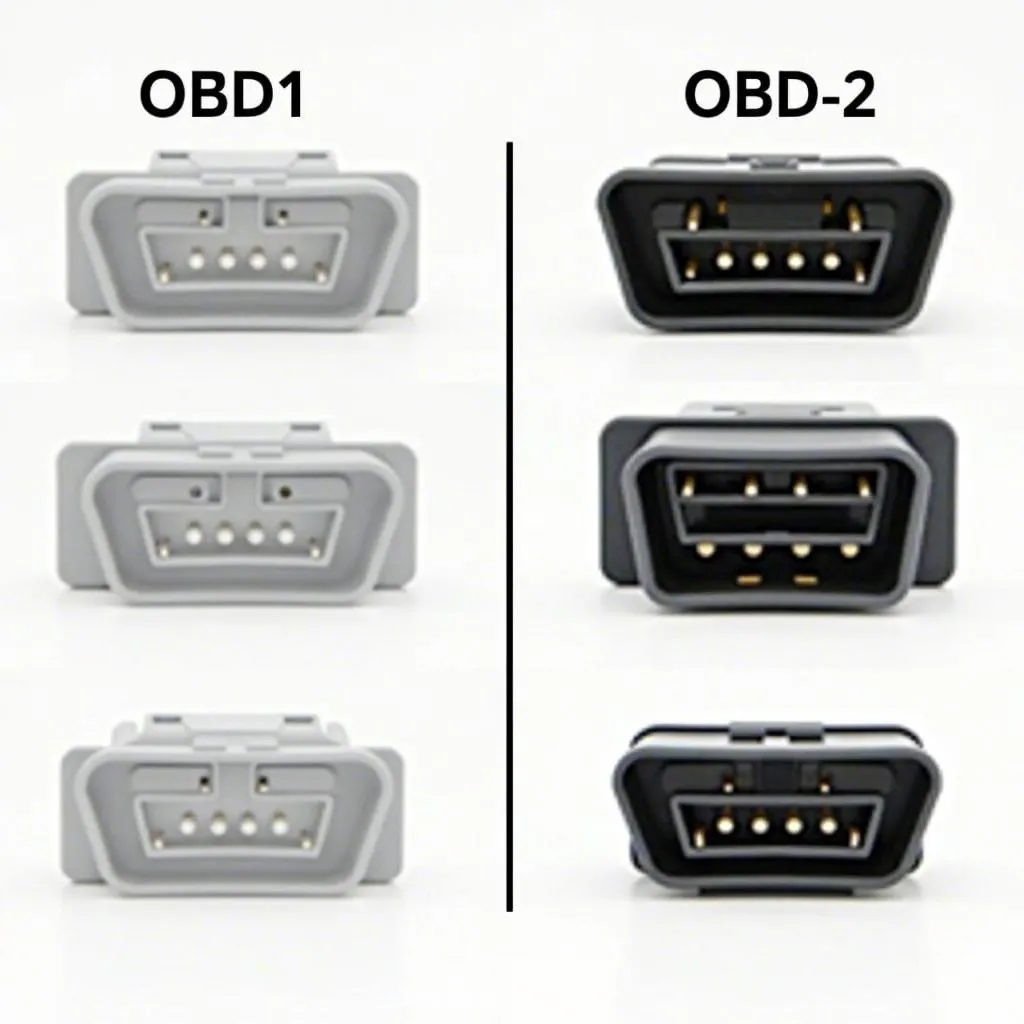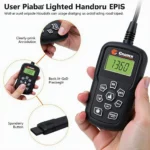You’ve got a classic car, a project in the garage, or maybe you’re just trying to keep an older vehicle running smoothly. You know that using an OBD2 scanner can unlock a treasure trove of information about your car’s health and performance. But there’s a catch – your car is equipped with an OBD1 system, and the shiny new scanner uses OBD2. So, you’re left wondering, “Do OBD1 to OBD2 adapters actually work?” Let’s dive into the world of OBD systems and explore the potential of these adapters.
Understanding the Divide: OBD1 vs. OBD2
Before we delve into adapters, let’s clarify the differences between OBD1 and OBD2. OBD, short for On-Board Diagnostics, is your car’s internal communication system. It monitors various components and reports any malfunctions through diagnostic trouble codes (DTCs).
OBD1, introduced in the late 1980s, was the first iteration of this system. It was primarily manufacturer-specific, meaning each carmaker had its own unique connectors, protocols, and DTCs. This lack of standardization made diagnosis tricky, often requiring specialized tools and knowledge for each vehicle.
OBD2, implemented in 1996, revolutionized car diagnostics by introducing a universal standard. Now, all vehicles sold in the US after 1996 use the same 16-pin connector, communication protocol (SAE J1939), and a standardized set of DTCs. This standardization made it easier for mechanics and car owners to diagnose and troubleshoot problems across different vehicle makes and models.
Bridging the Gap: The Role of OBD1 to OBD2 Adapters
The rise of OBD2 brought about more sophisticated and user-friendly diagnostic tools, like the OBD2 scanners we know today. However, this left older vehicles with OBD1 systems in a bit of a bind. This is where OBD1 to OBD2 adapters come in. These adapters, as their name suggests, aim to bridge the gap between older vehicles and modern diagnostic tools.
How they theoretically work:
- Physical Connection: The adapter plugs into your car’s OBD1 diagnostic port.
- Protocol Conversion: It attempts to translate the OBD1 signals and protocols into a format understandable by an OBD2 scanner.
- Data Transfer: If successful, the adapter allows the OBD2 scanner to communicate with your car’s computer, retrieve DTCs, and access other data.
The Reality Check: Do They Actually Work?
The effectiveness of OBD1 to OBD2 adapters is a complex issue. Here’s the honest truth:
- Limited Functionality: OBD1 systems were never designed to provide the same level of data richness as OBD2. Adapters might only retrieve basic engine-related codes, and even then, the information might be incomplete or cryptic.
- Compatibility Issues: Even within the realm of OBD1, there’s significant variation across car manufacturers and even specific models. An adapter that works for one car might be utterly useless for another.
- Quality Concerns: The market is flooded with cheap, generic adapters that often fail to deliver on their promises. Investing in a reputable brand from a trusted source like OBDFree is crucial.
In essence, OBD1 to OBD2 adapters can work, but their effectiveness is highly situational.
When Adapters Might Be Useful
While not a guaranteed solution, adapters can sometimes be helpful in certain scenarios:
- Retrieving Basic Engine Codes: If you’re dealing with simple engine problems, an adapter might be able to retrieve basic DTCs, giving you a starting point for diagnosis.
- Working with Supported Vehicles: Some adapters are specifically designed for certain makes and models, increasing the likelihood of compatibility.
- Supplementing Other Diagnostic Methods: An adapter, used in conjunction with other diagnostic tools and techniques, might provide additional insights into your car’s health.
Alternatives to Consider
Given the limitations of adapters, exploring alternative approaches for diagnosing OBD1 vehicles is wise:
- Consult a Specialized Mechanic: Seek out a mechanic experienced with older vehicles. They often possess the knowledge and tools to diagnose OBD1 systems effectively.
- Invest in Manufacturer-Specific Tools: For dedicated enthusiasts, investing in manufacturer-specific diagnostic tools might be worthwhile. These tools offer more comprehensive diagnostics for your particular make and model.
Making Informed Decisions: Key Takeaways
Navigating the world of OBD1 and OBD2 can be challenging. Here are the key takeaways to remember:
- OBD1 to OBD2 adapters can sometimes work, but their effectiveness is limited by compatibility and functionality issues.
- Thoroughly research adapter compatibility with your specific vehicle make, model, and year before purchasing.
- Consider the complexity of your diagnostic needs. For basic troubleshooting, an adapter might suffice, but more involved issues might require professional help or specialized tools.
If you’re unsure, consult with a trusted mechanic or automotive expert. They can provide tailored advice based on your specific vehicle and needs.
FAQs about OBD1 to OBD2 Adapters
Can I use any OBD2 scanner with an adapter?
While most OBD2 scanners will physically connect, their compatibility and functionality with an adapter depend on the adapter’s quality and the vehicle’s specific OBD1 system.
Will an adapter allow me to access all the same data as an OBD2 system?
No, OBD1 systems were not designed to provide the same level of data as OBD2. Adapters, at best, can only access a limited subset of information, primarily engine-related codes.
Are there any risks associated with using an OBD1 to OBD2 adapter?
While generally safe, using a low-quality or incompatible adapter could potentially damage your vehicle’s electrical system. Always choose reputable brands and ensure compatibility.
Can I leave an adapter plugged in all the time?
It’s generally not recommended. While modern OBD2 systems are designed for continuous monitoring, older OBD1 systems might not react well to a constantly connected adapter.
What should I do if the adapter doesn’t work?
Double-check compatibility, try different OBD2 scanners, and ensure the adapter is properly connected. If issues persist, consult a mechanic experienced with OBD1 systems.
Need Expert Help?
If you’re struggling with car diagnostics or have any automotive questions, our team of experts at OBDFree is here to help. We’re passionate about empowering car owners with the knowledge and tools they need to keep their vehicles running smoothly.
Contact us today for personalized assistance and expert advice!
WhatsApp: +1(641)206-8880
Email: [email protected]
We offer 24/7 customer support to assist you with all your automotive needs.

